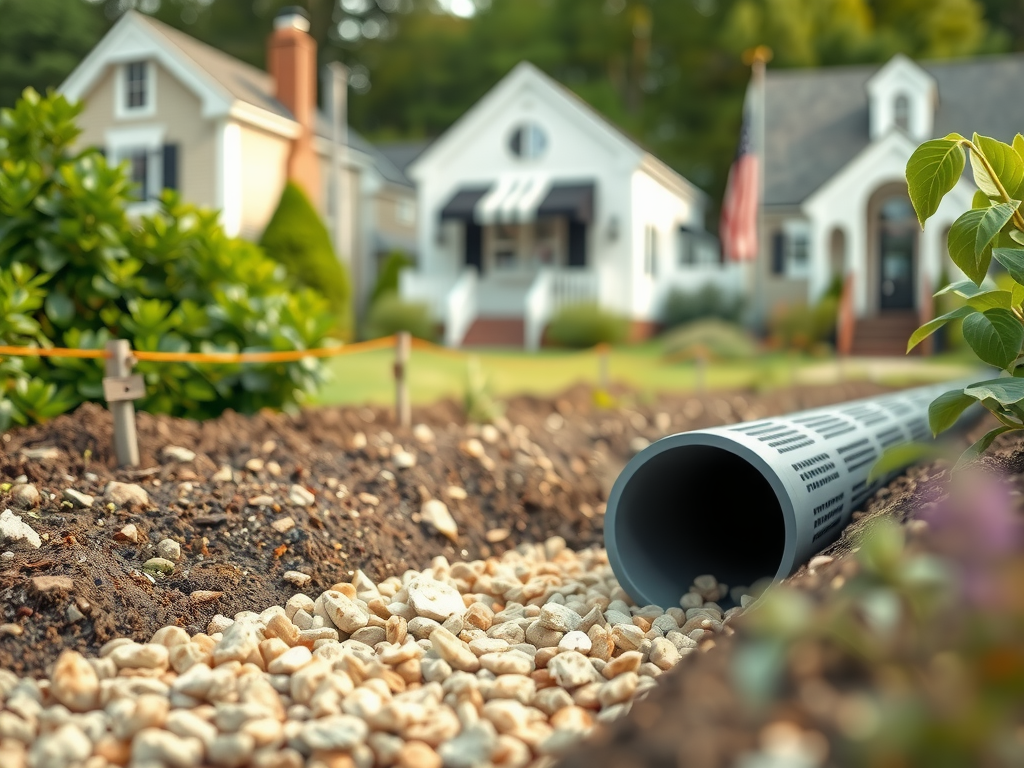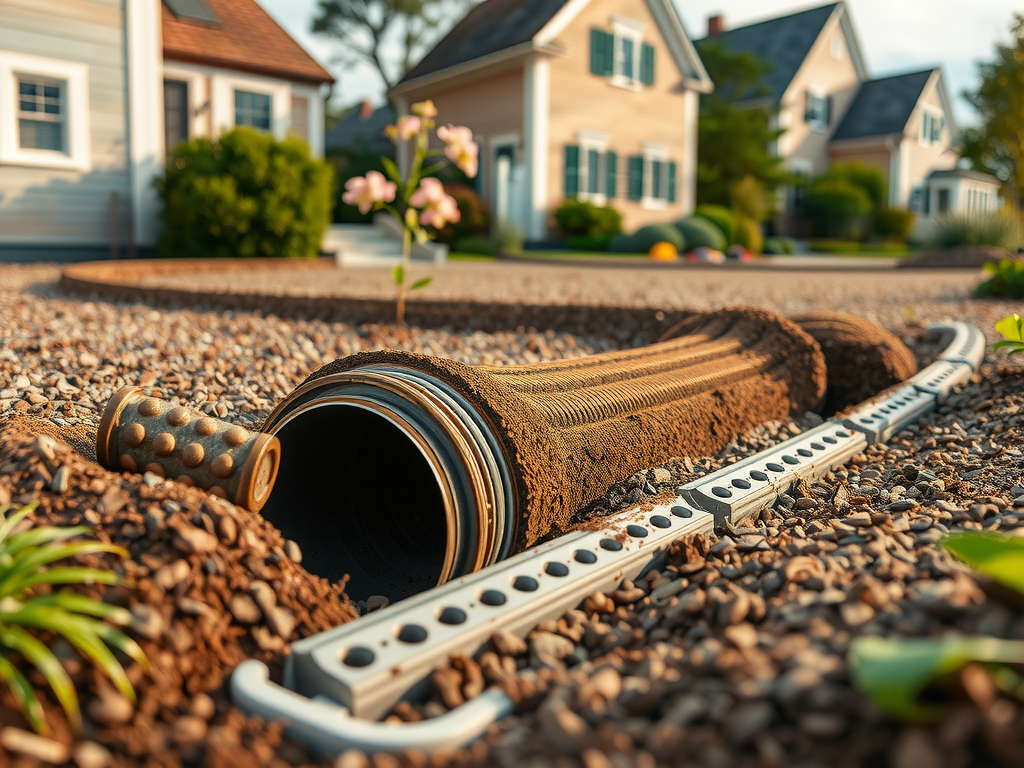
French drains are a popular drainage solution for homeowners in Cape Cod. These systems redirect groundwater and surface water away from homes and foundations.
They are essential in areas with high water tables and heavy rainfall, reducing flooding and foundation issues.
The French drain cost in Cape Cod typically ranges from $10 to $75 per linear foot.
Most projects result in total costs between $1,000 and $12,250, depending on length, depth, and site complexity. Equip yourself with this knowledge to make informed decisions about water management solutions for your property.
Average French Drain Cost Breakdown
Knowing the details of drainage installation costs helps you plan wisely.
Material costs for items like perforated pipe, gravel backfill, and geotextile fabric account for a smaller portion of overall expenses. Most of your budget will go toward labor, which varies due to local rates in Cape Cod.
Common labor expenses may add significantly to your total costs.
Set aside a buffer to cover unexpected expenses like sod replacement or lawn reseeding after installation.
This preparation ensures you can manage unforeseen costs during your installation project.
Key Cost Components
- French drain location: Interior or exterior systems may vary in price.
- Soil conditions: Different soil types affect excavation costs.
- Depth and length: Longer and deeper drains cost more.
- Added features: Sump pumps increase project costs but enhance system performance.
- Permitting: Local permits may be required, affecting total expenses.
Overall, the installation cost of a standard 100-foot French drain system ranges from about $1,000 to $6,Nationally, the average installation cost stands around $9,250, but local prices can differ. The long-term advantages of proper drainage solutions include preserving property value and preventing future moisture problems.
For effective groundwater redirection, consider hiring expert contractors. They ensure correct slope and water flow direction to maximize system efficiency. This decision protects your home from potential issues like flooding, erosion, or water pooling.

What Affects Cape Cod Drainage Pricing
Several factors influence the pricing of drainage solutions on Cape Cod. Soil type significantly affects costs.
For example, sandy soil may lower excavation expenses, while clay soil increases them.
Regional climate factors, such as heavy rainfall and high water tables, can also impact pricing.
Homeowners should consider obtaining multiple quotes to find the best deal. Resources for obtaining quotes include:
- HomeAdvisor. com
- Angie’s List
Multiple quotes help homeowners find competitive drainage pricing.
Linear Foot Pricing Factors
Project size affects linear foot pricing for drainage installations. Smaller projects often incur higher costs per foot due to setup and labor expenses. For instance, a 50-foot French drain may cost around $75 per linear foot. A larger project of 200 feet may reduce the cost to about $50 per foot. Economies of scale provide better pricing for larger installations. For example:
- A 50-foot French drain can total about $3,
- A 200-foot drain may total around $10,
Understanding project size helps in estimating drainage costs effectively.
Cape Cod Drainage Pricing
- Sandy soil can reduce excavation costs by up to 30% compared to clay soil.
- Heavy rainfall can increase drainage installation costs by 15% due to additional materials needed.
- Obtaining multiple quotes can save homeowners between 10-20% on drainage solutions.
- Economies of scale can lead to savings of over $25 per linear foot for larger drainage projects.
How Does Foundation Protection Work
Foundation protection systems, such as French drains, are important for maintaining structural integrity. Effective groundwater management involves redirecting water away from home foundations.
In regions like Cape Cod, these systems prevent flooding that could harm property value.
Ongoing maintenance improves effectiveness; regular checks of the drainage system help identify clogs or leaks.
Homeowners should monitor for signs of water pooling around the foundation. Inspecting walls and floors for cracks and moisture can reveal potential foundation issues.
Neglecting these checks can lead to costly repairs that could range from $2,000 to $7,000 or more.
Tips for Monitoring Foundation Health
Homeowners need to conduct regular inspections of their foundation protection systems. Observing moisture problems and seeking professional help can enhance the drainage effectiveness.
Checking soil conditions around the foundation is also essential.
Heavy rainfall and a high water table can exacerbate issues, making consistent monitoring important.
Implementing a routine can help address any foundation protection needs timely.
Importance Of Professional Installation
Investing in professional installation for drainage systems is key for long-term success. Quality work ensures proper drainage design, reducing the risk of costly errors.
Homeowners should seek expert contractors with a proven track record. They can enhance system efficiency and lower maintenance costs over time.
Professional installation can save homeowners up to 30% on future repair costs.
Selecting Qualified Contractors
When choosing a contractor, checking for proper licensing and insurance is essential, especially in Cape Cod.
Look for contractors with positive reviews and experience in drainage engineering.
Understanding installation complexity and local permits can also aid in the selection process.
Experienced professionals can help ensure correct slope and water flow direction.
Long-term Savings
Investing in professional drainage installation provides long-term advantages. Properly installed systems help preserve property value while preventing water damage repair costs.
Homeowners can experience enhanced landscape restoration with the right drainage solutions. Implementing effective groundwater redirection can protect homes from flooding, erosion, and moisture-related issues.
Foundation Protection
- Regular maintenance of drainage systems can prevent costly repairs that may range from $2,000 to $7,000 or more.
- Professional installation of drainage systems can save homeowners up to 30% on future repair costs.
- Effective groundwater management helps maintain property value by preventing flooding and moisture-related issues.
- Monitoring soil conditions and moisture problems around the foundation is crucial, especially in areas with heavy rainfall.
Assessing Site Conditions For Drainage
Identifying the right site conditions is essential for effective drainage. Topography significantly influences how water flows across your property.
Begin your assessment by observing the land’s slope to determine water flow direction.
Check for potential drainage issues that may arise from low spots or inclines.
Next, perform a soil evaluation to understand its composition and drainage capacity. Assess any existing structures that could obstruct water movement, like buildings or landscaping.
Recognizing these factors can help you plan a successful drainage installation and ensure effective groundwater management.
Steps to Conduct a Site Assessment
- Evaluate the slope of your land and its impact on water flow.
- Inspect soil conditions to identify drainage capacity.
- Look for low areas where water might pool.
- Identify structures that could block water movement.
- Consider installing a French drain to manage water effectively.
Effective Groundwater Management Solutions
Implementing advanced groundwater management techniques can significantly enhance water control on your property. One effective method is rainwater harvesting, which reduces the need for groundwater and helps manage surface water. Using permeable pavements can also facilitate water seepage, contributing to natural groundwater recharge.
Practical Tools for Monitoring Groundwater Levels
Installing water level sensors allows for real-time monitoring of groundwater fluctuations, helping homeowners stay informed. Smart irrigation systems adjust watering schedules based on soil conditions, promoting efficient water use and preventing excess moisture problems. These strategies improve overall drainage effectiveness and maintain property value.
Cost Considerations for Drainage Solutions
Average French drain cost on Cape Cod ranges from $10 to $75 per linear foot installed. Homeowners pay about $1,000–$6,500 for a standard 100-foot French drain system. The national average installation cost is around $9,250, but local prices can vary based on factors such as:
- Location of the drain (interior or exterior).
- Soil conditions and complexity of installation.
- Necessary permits and after-installation landscaping costs.
Professional installation ensures correct slope and effective groundwater redirection. Long-term benefits include preserving property value, reducing water damage repair costs, and maintaining a healthier home environment. Implementing these strategies can protect against flooding, erosion, and foundation issues.
Drainage Assessment and Management
- Proper site assessment can prevent costly drainage issues by identifying potential problem areas before installation.
- Rainwater harvesting can reduce reliance on groundwater by capturing and reusing rainwater for irrigation and other uses.
- Permeable pavements allow water to seep through, promoting natural groundwater recharge and reducing surface runoff.
- Professional installation of drainage systems ensures optimal performance and compliance with local regulations, protecting property value.
Longterm Advantages Of Drainage Systems
Investing in drainage systems provides many longterm benefits for homeowners. These systems enhance property value preservation.
Homes with effective drainage face fewer moisture problems.
Proper drainage reduces risks associated with flooding, leading to fewer water damage repairs over time.
A well-designed system contributes to environmental sustainability.
It controls water runoff and promotes healthy soil conditions. Homebuyers often favor properties with established drainage solutions.
This can lead to increased resale value. Property owners often see a favorable return on investment.
Thus, drainage installation is an essential aspect of home care.
Insights on Drainage Installation Costs
The average French drain price on Cape Cod is between $10 to $75 per linear foot installed.
Most projects range from $1,000 to $12,250+, depending on the length, depth, and site complexity.
Homeowners typically pay about $1,000–$6,500 for a standard 100-foot French drain system.
- National average installation cost: $9,250
- Price factors include:
- Drain location (interior or exterior)
- Soil conditions
- Length and depth
- Sump pumps
- Permits
- Landscaping repairs after installation
Materials like pipe, gravel, and geotextile fabric are a smaller portion of the total cost. Labor is the primary expense. Additional costs may arise for sod replacement or lawn reseeding after installation.
Benefits of Professional Installation
Professional installation ensures correct slope and water flow direction. Effective groundwater redirection is vital. Experienced contractors help manage the installation complexity and drainage engineering involved.
Installing a French drain protects against flooding, erosion, mold, and foundation issues. Exterior systems are typically less expensive, but they may not address severe basement water issues. Interior drains cost more but provide added protection.
Adding a sump pump enhances system performance in areas with high water tables. Permitting requirements may vary based on local Cape Cod regulations and project scope.
Longterm advantages include preserving property value, reducing water damage repairs, and maintaining a healthier home environment. French drains, also called weeping tiles or perimeter drains, are effective solutions for moisture management.
Drainage Systems
- Homes with effective drainage systems experience fewer moisture problems and reduced risks of flooding.
- The average installation cost for a French drain on Cape Cod ranges from $1,000 to $12,250+, depending on various factors.
- Professional installation ensures correct slope and water flow direction, which is vital for effective groundwater redirection.
- Adding a sump pump can enhance drainage system performance, especially in areas with high water tables.
